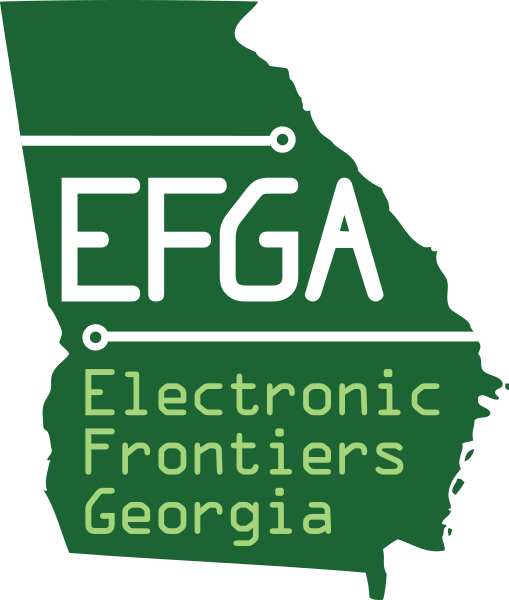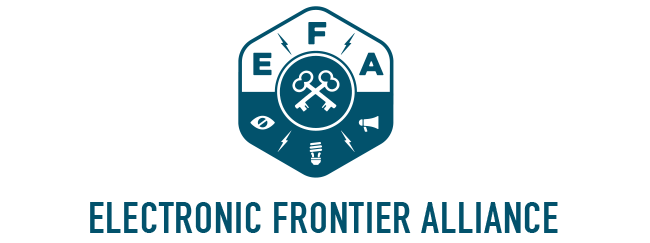- Details
- Written by Scott M. Jones
- Category: General Information
- Hits: 19433
Subject to change and evolve over time. Check back for updates.
Click here to view or download a PDF copy of our Key Policy Position one-pager.
Government should be transparent / open to public feedback
Property rights should extend to technology
- Right to repair
- Right to reverse engineer (disability access, security research, education, etc.)
- Right to to make copies for backup
- see DMCA (Digital Millennium Copyright Act)
Copyrights
- Copyrights should have reasonable limits, then should go into public domain as originally intended
Patents
- Companies, individuals, universities, and government divisions should use their patents for useful products and services, not lawsuits (patent trolling)
- Possible idea: “Put it in play” requirement – patent must be put to use in a certain amount of time or should expire
Encryption
- Strong Encryption should not be a crime but should be defended, privacy is an important part of security and freedom -- especially important to minorities and “at risk” populations
- Encryption is a cornerstone of finance, business transactions, health care - there is no way to “weaken” or “back door” encryption without leaving it wide open (“A back door for one is a back door for all”)
- see Apple v. FBI
Network Neutrality / Title II & Internet Governance
- Congress should take an active role and not leave it up to regulatory authorities to define policy for Internet governance
- Mozilla Poll: 76% of Americans across the aisle agree on fundamentals of Network Neutrality
- Equal access, no preference, discrimination or throttling based on content
- Broadband customers should have the right to opt-out of data collection (snooping), tracking (cookies), and customized advertising
- Citizens have the right to control information about themselves without onerous processes (re: data brokers)
- Users should have the right to be anonymous online
- Students/parents should have control of their data and can opt-out
- see Network Neutrality/Title II and CRA SJ34
FOSS – Free and/or Open Source Software
- Schools and Governments should encourage but not require OpenSource software for its security, cost, and educational value
- Voting software should be OpenSource, secure, audited, and kept up-to-date
Work
- Limited Non-compete agreements
- Should not allow biometric or medical data to impact employment opportunities
Surveillance Concerns (Police, TSA, Federal Bureaus) Items that need more oversight and transparency to citizens:
- Biometric Collection
- Stingrays
- Mass CCTV / Facial Recognition / License Plate scanners
- Body Scanners
- Shotspotter
- Persistent Surveillance Systems
- Drones
- Security organizations shouldn’t be stockpiling “0-Day exploits”, as has been witnessed recently, this can lead to massive vulnerabilities
- Legal framework for monitoring ads and signage that sniff WiFi traffic to produce more targeted ads - need opt-outs, or honoring a Do-Not-Track request
- see Section 702 of FISA Act
Legislation and court cases that have had an impact on civil rights from technology standpoint (*):
- Apple v. FBI
- CRA SJ34
- DMCA (Digital Millennium Copyright Act)
- GA HB-509 (Internet Blocking Act) - this is a state-level act, but it’s not unheard of that something like this might also appear at the Federal level
- FISA Act, Section 702 allows Americans to be swept up in bulk data collection
- Miller v. ACLU
- Network Neutrality / Title II designation
- PATRIOT Act
- SOPA (Stop Online Piracy Act) / PIPA (Protect IP Act) - neither passed, but will likely come up again in another incarnation
- Wassenaar Arrangement
* Technology specialists who are politically active are concerned about these.
- Details
- Written by Scott M. Jones
- Category: General Information
- Hits: 23476
Electronic Frontiers Georgia is proud to announce its new logo, adopted April 2017. Design contributed by Neal Cross. Thanks!!
We will be incorporating the logo in all media over time.

- Details
- Written by Scott M. Jones
- Category: General Information
- Hits: 23648

The Electronic Frontier Alliance (EFA) is a program by the Electronic Frontier Foundation (EFF) designed to support, encourage, and inform like-minded grass-roots organizations across the U.S.A.
Electronic Frontiers Georgia (EFGA) endorses and supports the five principles of the Electronic Frontier Alliance.
- Free Expression: People should be able to speak their minds to whomever will listen.
- Security: Technology should be trustworthy and answer to its users.
- Privacy: Technology should allow private and anonymous speech, and allow users to set their own parameters about what to share with whom.
- Creativity: Technology should promote progress by allowing people to build on the ideas, creations, and inventions of others.
- Access to Knowledge: Curiosity should be rewarded, not stifled.
More information about the EFA is available here. EFGA encourages other like-minded groups to consider joining EFA to help coordinate and maximize your efforts!
- Details
- Written by Scott M. Jones
- Category: General Information
- Hits: 21033
Upcoming Events:
- Wed., Dec. 14, 2022: How to Write Legislation and Legislative Amendments w/ Rep. Marvin Lim (virtual)
Past Events:
- Wed., Sept. 14, 2022: An Alphabet Soup of Privacy Legislation (virtual)
- Thur., Sept. 1 through Mon., Sept. 5, 2022: DragonCon 2022
- Sat., Aug. 27, 2022: B-Sides Atlanta
- Wed., July 13, 2022: New DOJ CFAA Policy for Security Researchers (virtual)
- Sun., June 12, 2022: EFGA OUTDOOR In-Person Social (Lunch/Talk/Learn/Activate)
- Wed., May 4, 2022: Documentary: Suppressed & Sabotaged: The Fight To Vote (virtual)
- Wed., April 6, 2022: EARN-IT Act: An End Run Around Encryption? (virtual)
- Wed., March 2, 2022: Georgia Legislative Proposals to Regulate Social Media (virtual)
- Wed., Feb. 23, 2022: The Trouble with Gunshot Detection Systems (virtual)
- Wed., Sept. 22, 2021: What's All the Fuss About Apple's CSAM Solution? (virtual)
- Wed., Aug. 18, 2021: Georgia's New Anti-'Revenge Porn' Law (virtual)
- Tues., July 20, 2021: Negative Space Signaling: A Threat to Election Integrity? (virtual)
- Wed., April 28, 2021: Georgia 2021 Legislative Wrap-Up with Rep. Becky Evans (virtual)
- Wed., March 3, 2021: Georgia Gold Dome Roundup (virtual)
- Wed., Feb. 17, 2021: What's All the Fuss About Section 230? (Virtual meeting)
- Thur., Jan. 28, 2021: Atlanta Data Town Hall by Restore the Fourth
- Thur., Feb. 13, 2020: Lunch Talk Learn Activate @Pho Da Loi #2
- Thur., Jan. 30, 2020: Georgia's New Voting Machine Demo and Discussion
- Thur., Jan. 9, 2020: Lunch Talk Learn Activate @Pho Da Loi #2
- Thur., Dec. 12, 2019: Lunch Talk Learn Activate @Pho Da Loi #2
- Thur., Nov. 14, 2019: Lunch Talk Learn Activate @Pho Da Loi #2
- Thur., April 4, 2019: Sine Die Party (end of Legislative Session)
- Thur., Jan. 3, 2019: VENDOR DEMONSTRATION OF ELECTION TECHNOLOGY
- Mon., May 14, 2018: SB 315 Veto Appreciation Party
- Wed., May 2, 2018: SB 315 Round Table Panel Discussion (YouTube video)
- Thur., April 5, 2018: Net Neutrality Event at David Perdue's Office (Cross-listed)
- Sat., Feb. 17, 2018: Georgia's SB315: The New Computer Intrusion Bill (Be Afraid, Be Very Afraid)
- Tues. Feb. 6, 2018: GA SB315 Lobby Day at the Georgia State Capitol
- Thur. Dec. 14, 2017: Electronic Frontiers Georgia Holiday Social
- Thur. Dec. 7, 2017 (5pm): Net Neutrality Protest In Front of Verizon Store (Buckhead)
- Thur. Oct. 26, 2017: OSIA Movie Night "Terms and Conditions May Apply" (Cross-listed)
- Thur. Oct. 12, 2017: SESTA Act: Defending Online Speech and Communities (YouTube video)
- Thur. Sept. 28, 2017: Is Our Voting System Accurate & Safe from Hacking? (Cross-listed)
- Wed. Sept. 13, 2017: Level-Up Your Security: Protecting What Matters to You (YouTube video)
- Fri. Sept. 1 - Mon. Sept. 4, 2017: Electronic Frontiers Forums at DragonCon
- Thur. Aug. 24, 2017: Gerrymandering, Voter Suppression, and Voting Machines (YouTube video)
- Mon. Aug. 14, 2017: Level-Up Your Security: Protecting What Matters to You (Summary-PDF, YouTube video)
- Thur. July 27th, 2017: Network Neutrality: What's All This About Title II?
- Wed. May 31, 2017: Electronic Frontiers Georgia Business/Volunteer Meeting
- Mon. May 1, 2017: Cybersecurity Panel Discussion at Georgia Tech (cross-listed)
- Thur. April 27, 2017: EF Georgia Social Event
- Tues. April 18, 2017: Surveillance, Privacy, and Data Across Borders: Trans-Atlantic
Perspectives - Wed. April 5, 2017: Net Neutrality and Georgia H.B. 509 (Repeat performance at Prototype Prime)
- Tue. April 4, 2017: Net Neutrality & HB 509: How You Can Speak Out About Bad Internet Policy
- Thu. Feb. 23, 2017: Surveillance: Defense, Offense, and Why Nothing Less than Democracy is at Stake (video)
- Wed. Feb. 22, 2017: Surveillance: Defense, Offense, and Why Nothing Less than Democracy is at Stake
- Mon. Feb. 13, 2017: Cyber Civil Liberties and the New Administration featuring Hon. Bob Barr
- Details
- Written by Scott M. Jones
- Category: General Information
- Hits: 23167
Electronic Frontiers Georgia (EFGA) was founded in 1995 by Tom Cross, Robert Costner, Chris Farris, and Robbie Honerkamp. Scott M. Jones joined in 1996.
Some key accomplishments during the initial period:
- Sued the state of Georgia along with ACLU-GA (ACLU v. Miller) to oppose a bill that at its broadest reading could have outlawed pseudonyms on the Internet. This effort was successful and the law was enjoined in court.
- Lobbied for a market-based approach to electronic commerce, rather than the "Utah model" which would have put the state in charge of certification agencies. This effort was successful.
- Coordinated opposition to the "State DMCA's", cable-industry laws with unreasonably harsh penalties that would have enabled de-facto state-mandated copyright legislation. This effort was successful.
- Opposed a state-level bill that makes it illegal to film movies in theaters or other venues where movies are being shown. EFGA missed this bill in committee and was unsuccessful in stopping it.
- Hosted several educational talks at Atlanta-area venues as well as "coffee-shop activist" meetings.
- Spawned a successful series of educational talks at the DragonCon Science Fiction Convention known as Electronic Frontiers Forums. This lecture series continues to this day.
Aside from Electronic Frontiers Forums, EFGA became inactive around 2007. Given recent political changes, we are working to re-start the group!
Our Wikipedia page is here.
